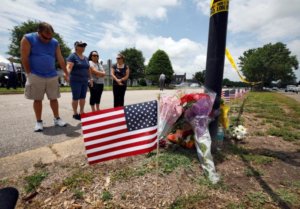
VIRGINIA BEACH, Va. — Bishop Barry C. Knestout of Richmond celebrated Masses at St. Gregory the Great and St. John the Apostle churches in Virginia Beach June 2, two days after 12 people were killed in the city’s Municipal Center.
One victim, Kate Nixon, was a member of St. Gregory the Great; another, Mary Lou Gayle, was a member of St. John the Apostle.
“After tragedy and sudden loss, we often have many unanswered, and even unanswerable questions,” the bishop said during his homily. “This leads to anxiety and maybe even depression or despair. How can one move forward with so much loss?”
He noted that the ordination of five priests for the diocese the previous day and the feast of the Ascension that Sunday were to be occasions of joy and thanksgiving, but “there seems little for us to celebrate.”
“All we can feel is a sadness in our hearts, and for those for whom the loss is closer, and its sting, so much greater,” Bishop Knestout said. “There is the mixture of emotion: grief, anger, anxiety or maybe even, understandably, bitterness and rage at the injustice of it.”
He continued, “How could such horrific things keep happening? And why did it happen this way — why do the young and innocent so senselessly and shockingly have their lives taken from them? What could the feast of the Ascension possibly provide for us in these circumstances?”
Drawing upon the readings for the feast of the Ascension, Bishop Knestout noted that during their “time of uncertainty, confusion and loss,” the apostles kept their feet “firmly on the ground” and “their eyes fixed on the prize of heaven.” That, he said, allowed them to persevere, despite bitterness, anger and despair.
Bishop Knestout said the killings on May 31 “require us to assess our values and hopes.”
“Where do we stand now, where do we place our trust and where do we long to be?” he said.
The bishop said that, like the apostles, the faithful need to keep their feet on the ground, while keeping “their eyes fixed on heaven and the glory that awaits.” He added that all should “seek to live a life of charity.”
“To me this is the best way to confront situations of tragic loss and evil violence,” he said. “Don’t let it conquer us in bitterness and anger, but conquer it with self-giving, sacrificial love.”
Bishop Knestout concluded by reiterating the words of St. Paul to the Ephesians from that day’s second reading (1:18-19): “May the eyes of your hearts be enlightened, that you may know what is the hope that belongs to his call, what are the riches of glory in his inheritance among the holy ones, and what is the surpassing greatness of his power for us who believe, in accord with the exercise of his great might: which he worked in Christ.”
Copyright ©2019 Catholic News Service/U.S. Conference of Catholic Bishops.


